 |
UK SOUTHERN CHAPTER - 01/23/2025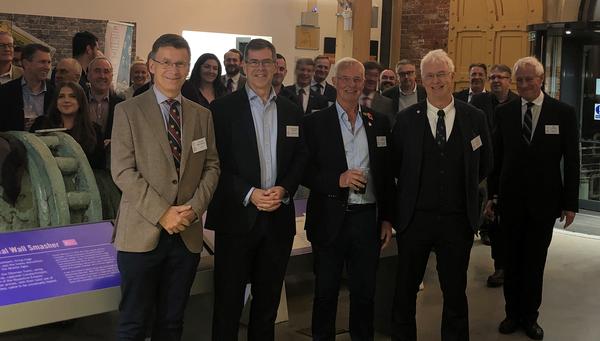 In October 2024, the chapter hosted Steve Thornber, strategic consultant and air commodore, Royal Air Force Reserve in UK Strategic Command.
In October 2024, the chapter hosted Steve Thornber, strategic consultant and air commodore, Royal Air Force Reserve in UK Strategic Command.Thornber discussed the need for an urgent revolution across the UK defense's digital enterprise. In a changing world of shifting global geopolitics and the availability of industry's emerging capabilities, defense must take a digital enterprise approach that is versatile and can be developed at pace. It was also an opportunity for all three chapter presidents of the UK AFCEA active chapters to come together to discuss further AFCEA collaboration. Nigel Harrison, AFCEA South, took the opportunity to present a check for £1,000 to the AFCEA Academic Trust set up to advance education in defense communications, electronics and information technology through the promotion of academic excellence. |
UK SOUTHERN CHAPTER - 05/17/2012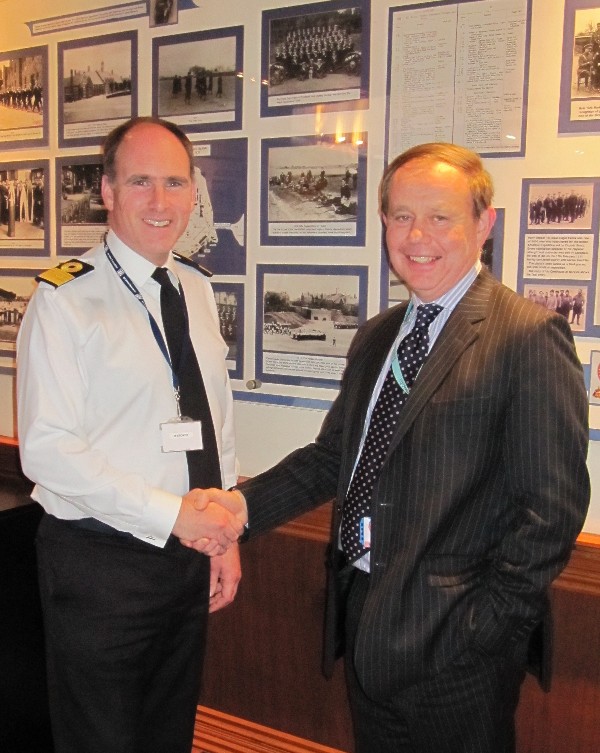 In May, the chapter welcomed Cdre. Richard Stokes, RN, programme director for defence reform implementation, who spoke on "Future Maritime Capability.” He posed the question: “What kind of Navy will result now that the U.K. Ministry of Defence (MOD) has announced a balanced budget?” Members heard from the speaker that 40 percent of the MOD's equipment budget would be at the Navy's disposal, and $5 billion has been allotted for command, control, communications, computers, information/intelligence, surveillance, targeting acquisition and reconnaissance (including cyber). Cdre. Stokes outlined the new organization, describing how front-line commands would have direct responsibility for equipment. A new reserve fund (7 percent of the total) had been set aside to allow additional capability to be acquired. Thus, currently unfunded projects will be held on a Single Integrated Priorities List for when funds may be allocated. Russell Searle, chapter president, thanked the commodore for his ... READ MORE
In May, the chapter welcomed Cdre. Richard Stokes, RN, programme director for defence reform implementation, who spoke on "Future Maritime Capability.” He posed the question: “What kind of Navy will result now that the U.K. Ministry of Defence (MOD) has announced a balanced budget?” Members heard from the speaker that 40 percent of the MOD's equipment budget would be at the Navy's disposal, and $5 billion has been allotted for command, control, communications, computers, information/intelligence, surveillance, targeting acquisition and reconnaissance (including cyber). Cdre. Stokes outlined the new organization, describing how front-line commands would have direct responsibility for equipment. A new reserve fund (7 percent of the total) had been set aside to allow additional capability to be acquired. Thus, currently unfunded projects will be held on a Single Integrated Priorities List for when funds may be allocated. Russell Searle, chapter president, thanked the commodore for his ... READ MORE
|
|
UK SOUTHERN CHAPTER - 06/16/2011 |
|
UK SOUTHERN CHAPTER - 03/17/2011 The general admitted frankly in his introduction that demand was insatiable and could not be met. It was driven both by technology and the common operating environment, and he provided sobering examples of how the demand was increasing and where it would go in the future. He highlighted factors that contribute to the inability to meet the demand, including the slowness of MOD processes, the complicated MOD environment and inappropriate culture, and the increasing budgetary pressure and multiple layers of approval needed. According to the general, a new approach for acquiring information systems is needed that can be ... READ MORE |
UK SOUTHERN CHAPTER - 02/17/2011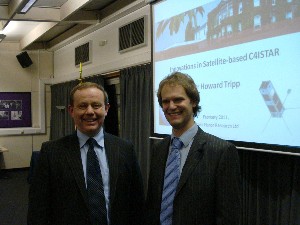 Roke Manor Research Limited (RMR) hosted the chapter's February meeting. One of RMR's leading consultants in the space field, Dr. Howard Tripp, gave a presentation on emerging satellite technology that is currently largely driven academically, but which has the potential to have real impact in the defense domain for sensing and communications. For the benefit of those not well versed in the field, Tripp included an eye-opening primer on the basics of satellite orbits and the existing military uses of satellites before describing the emergence of CubeSat nano-satellites, including the recently announced UKube-1 commercially-based program, which offers to provide command, control, communications, computers, intelligence, surveillance, target acquisition and reconnaissance capabilities at orders of magnitude less cost than conventional satellites.
Roke Manor Research Limited (RMR) hosted the chapter's February meeting. One of RMR's leading consultants in the space field, Dr. Howard Tripp, gave a presentation on emerging satellite technology that is currently largely driven academically, but which has the potential to have real impact in the defense domain for sensing and communications. For the benefit of those not well versed in the field, Tripp included an eye-opening primer on the basics of satellite orbits and the existing military uses of satellites before describing the emergence of CubeSat nano-satellites, including the recently announced UKube-1 commercially-based program, which offers to provide command, control, communications, computers, intelligence, surveillance, target acquisition and reconnaissance capabilities at orders of magnitude less cost than conventional satellites.
|
|
UK SOUTHERN CHAPTER - 01/20/2011 |
UK SOUTHERN CHAPTER - 10/28/2010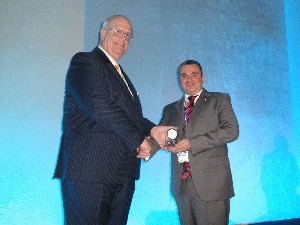 In October, Kent R. Schneider, president and chief executive officer of AFCEA International, visited TechNet International 2010 in London. During his trip, he presented an AFCEA Meritorious Service Award to Capt. Martin Murray, British Army, Royal Corps of Signals. Capt. Murray has been a stalwart of the chapter for a number of years.
In October, Kent R. Schneider, president and chief executive officer of AFCEA International, visited TechNet International 2010 in London. During his trip, he presented an AFCEA Meritorious Service Award to Capt. Martin Murray, British Army, Royal Corps of Signals. Capt. Murray has been a stalwart of the chapter for a number of years.
|
|
UK SOUTHERN CHAPTER - 09/16/2010 |
|
UK SOUTHERN CHAPTER - 04/22/2010 |
UK SOUTHERN CHAPTER - 03/18/2010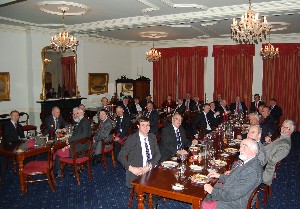 In March, the chapter held its "Corporate Evening" at the Royal Naval and Royal Albert Yacht Club in Old Portsmouth. The guest speaker was Lt. Col. Ian Buchanan, British Army, of the Cyber and Influence Science and Technology Centre at Porton Down. Col. Buchanan's presentation—titled "Cyber Warfare: Science Fiction or Science Fact?"—addressed the reality of existing threats and how authorities are still unprepared to meet them. He explained that the cyber battlespace is more abstract than the geographic background with which people are familiar. It is this abstract nature that makes the threats so pervasive and difficult to address. Following the colonel's presentation, a question and answer session centered on some of the chilling examples he had described, with options for meeting these threats in the future.
In March, the chapter held its "Corporate Evening" at the Royal Naval and Royal Albert Yacht Club in Old Portsmouth. The guest speaker was Lt. Col. Ian Buchanan, British Army, of the Cyber and Influence Science and Technology Centre at Porton Down. Col. Buchanan's presentation—titled "Cyber Warfare: Science Fiction or Science Fact?"—addressed the reality of existing threats and how authorities are still unprepared to meet them. He explained that the cyber battlespace is more abstract than the geographic background with which people are familiar. It is this abstract nature that makes the threats so pervasive and difficult to address. Following the colonel's presentation, a question and answer session centered on some of the chilling examples he had described, with options for meeting these threats in the future.
|
|
UK SOUTHERN CHAPTER - 01/18/2010 |
|
UK SOUTHERN CHAPTER - 02/18/2010 |
|
UK SOUTHERN CHAPTER - 10/22/2009 |
|
UK SOUTHERN CHAPTER - 06/18/2009 |
UK SOUTHERN CHAPTER - 05/21/2009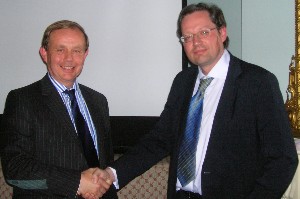 Mike Larner, program manager at the U.K. Defence Science and Technology Laboratory, discussed the Persistent Wide Area Surveillance High Impact Rapid Implementation Demonstrator (PWAS HIRID) during his keynote speech in May. He emphasized the need for and the benefits of the HIRID concept.
Mike Larner, program manager at the U.K. Defence Science and Technology Laboratory, discussed the Persistent Wide Area Surveillance High Impact Rapid Implementation Demonstrator (PWAS HIRID) during his keynote speech in May. He emphasized the need for and the benefits of the HIRID concept.
|
UK SOUTHERN CHAPTER - 05/15/2008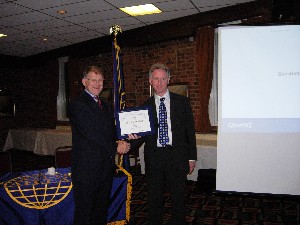 In May, the chapter met at The Vine Inn near Romsey. Following supper, guest speaker Stuart Bennett, a scientist from QinetiQ, described work conducted over a period of three years on a maritime tactical network command and control capability technology demonstrator. Under contract from the U.K. Ministry of Defence, Bennett explained, the program provided a tactical wide area network supporting Internet-protocol-based command and control services. Three land-based trials and two sea trials were undertaken during the program, which successfully demonstrated the full capability required. Stuart then participated in a question-and-answer session with attendees.
In May, the chapter met at The Vine Inn near Romsey. Following supper, guest speaker Stuart Bennett, a scientist from QinetiQ, described work conducted over a period of three years on a maritime tactical network command and control capability technology demonstrator. Under contract from the U.K. Ministry of Defence, Bennett explained, the program provided a tactical wide area network supporting Internet-protocol-based command and control services. Three land-based trials and two sea trials were undertaken during the program, which successfully demonstrated the full capability required. Stuart then participated in a question-and-answer session with attendees.
|
UK SOUTHERN CHAPTER - 02/01/2008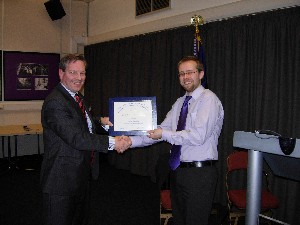 Roke Manor Research hosted the chapter in February. Greg Moore of Roke delivered a talk on evaluation of network-enabled capabilities (NEC). Focused on close combat groupings the work done by modelling, simulation and experimentation enabled proof of the value of NEC in enforcing the information sharing, understanding, decisions, actions and effects loop. Moore submitted that taking the work forward to brigade and higher levels would be difficult but not impossible.
Roke Manor Research hosted the chapter in February. Greg Moore of Roke delivered a talk on evaluation of network-enabled capabilities (NEC). Focused on close combat groupings the work done by modelling, simulation and experimentation enabled proof of the value of NEC in enforcing the information sharing, understanding, decisions, actions and effects loop. Moore submitted that taking the work forward to brigade and higher levels would be difficult but not impossible.
|
UK SOUTHERN CHAPTER - 04/20/2007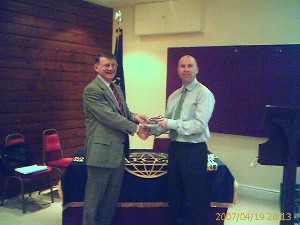 In April the chapter took in a discussion on the topic of secure wireless networking. The guest speaker, introduced by Col. Tom Moncur, British Army, chapter president, was Steve Rodgers of Fortress Technologies. Rodgers explained the development of wireless technology, which he said was first introduced largely for domestic use and has subsequently been adopted by the business community. He went on to describe the four types of networks for which Fortress provide solutions (traditional wireless local-area network, fixed wireless, deployable networks and mobile edge), and illuminated the relevance and utility of these solutions with a selection of case studies from all over the world.
In April the chapter took in a discussion on the topic of secure wireless networking. The guest speaker, introduced by Col. Tom Moncur, British Army, chapter president, was Steve Rodgers of Fortress Technologies. Rodgers explained the development of wireless technology, which he said was first introduced largely for domestic use and has subsequently been adopted by the business community. He went on to describe the four types of networks for which Fortress provide solutions (traditional wireless local-area network, fixed wireless, deployable networks and mobile edge), and illuminated the relevance and utility of these solutions with a selection of case studies from all over the world.
|
UK SOUTHERN CHAPTER - 02/25/2007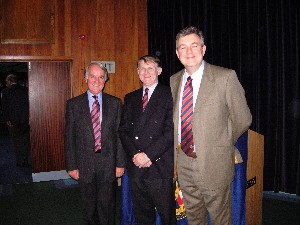 February marked the inaugural meeting of the Blandford sub-chapter, which was authorized in December 2006 and is sponsored by UK Southern. Held at Blandford Camp, home of the Royal School of Signals, approximately 70 Young AFCEANs who are students at the Defence College for Communications and Information Systems (CIS) attended the meeting. The sub-chapter will have a program tailored to the needs of Defence College students. Cdre. Robert Howell, RN, general manager of AFCEA Europe, discussed the mission of AFCEA and the organization's initiatives, in particular the expansion in Europe. Brig. Edward M Flint, BA, commandant of the Defence College for CIS, concluded the meeting by thanking the speaker and emphasizing the importance of AFCEA.
February marked the inaugural meeting of the Blandford sub-chapter, which was authorized in December 2006 and is sponsored by UK Southern. Held at Blandford Camp, home of the Royal School of Signals, approximately 70 Young AFCEANs who are students at the Defence College for Communications and Information Systems (CIS) attended the meeting. The sub-chapter will have a program tailored to the needs of Defence College students. Cdre. Robert Howell, RN, general manager of AFCEA Europe, discussed the mission of AFCEA and the organization's initiatives, in particular the expansion in Europe. Brig. Edward M Flint, BA, commandant of the Defence College for CIS, concluded the meeting by thanking the speaker and emphasizing the importance of AFCEA.
|
UK SOUTHERN CHAPTER - 03/15/2007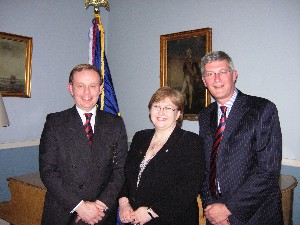 The March meeting, held at the Royal Navy Club/Royal Albert Yacht Club, featured a presentation by guest speaker Brig. David Meyer, BA, assistant chief of staff, Command and Battlespace Management, Ministry of Defence HQ LAND Command. He addressed command, control, communications, computers, intelligence, surveillance, target acquisition and reconnaissance (C4ISTAR) with a speech entitled 'LAND - the Ugly Duckling of the C4ISTAR Establishment.' Brig. Meyer discussed his personal background as commander, 11th Signal Brigade, with which he was directly involved in Iraq operations; he used his experience to provide concrete examples in planning, network control, logistics, security, culture and information assurance. Among those attending the frank discussion of challenges in planning and mounting operations was Jean McLeish, recently appointed regional vice president for the United Kingdom. The evening closed with a dinner in the club's ballroom and follow-up questioning afterward.
The March meeting, held at the Royal Navy Club/Royal Albert Yacht Club, featured a presentation by guest speaker Brig. David Meyer, BA, assistant chief of staff, Command and Battlespace Management, Ministry of Defence HQ LAND Command. He addressed command, control, communications, computers, intelligence, surveillance, target acquisition and reconnaissance (C4ISTAR) with a speech entitled 'LAND - the Ugly Duckling of the C4ISTAR Establishment.' Brig. Meyer discussed his personal background as commander, 11th Signal Brigade, with which he was directly involved in Iraq operations; he used his experience to provide concrete examples in planning, network control, logistics, security, culture and information assurance. Among those attending the frank discussion of challenges in planning and mounting operations was Jean McLeish, recently appointed regional vice president for the United Kingdom. The evening closed with a dinner in the club's ballroom and follow-up questioning afterward.
|
UK SOUTHERN CHAPTER - 02/07/2006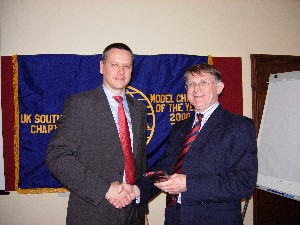 Lt. Col. Chris Richards from the Defence Procurement Agency was the guest speaker at the UK Southern Chapter February meeting at the Hall & Woodhouse Brewery Visitors' Centre at Blandford in Dorset, which has become a favorite meeting place for our members. Col. Tom Moncur, chapter president, introduced the speaker, who addressed the role, organization and activities of the Ministry Of Defence's Integration Authority. He explained the importance of ensuring, at the earliest possible stages in the procurement cycle, that proposed systems conform to the established architectural framework, assuring system interoperability and compliance with standards. Tools associated with the Defense Department's Architectural Framework were described as aiding assessment of strategic, operational, systemic, technical and other parameters in a project's life cycle. In closing he outlined the Authority's international interests and work on GII and message architectures, and noted the pressures on its ... READ MORE
Lt. Col. Chris Richards from the Defence Procurement Agency was the guest speaker at the UK Southern Chapter February meeting at the Hall & Woodhouse Brewery Visitors' Centre at Blandford in Dorset, which has become a favorite meeting place for our members. Col. Tom Moncur, chapter president, introduced the speaker, who addressed the role, organization and activities of the Ministry Of Defence's Integration Authority. He explained the importance of ensuring, at the earliest possible stages in the procurement cycle, that proposed systems conform to the established architectural framework, assuring system interoperability and compliance with standards. Tools associated with the Defense Department's Architectural Framework were described as aiding assessment of strategic, operational, systemic, technical and other parameters in a project's life cycle. In closing he outlined the Authority's international interests and work on GII and message architectures, and noted the pressures on its ... READ MORE
|
UK SOUTHERN CHAPTER - 06/01/2006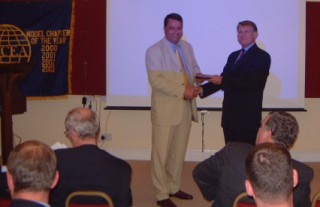 At the June meeting of the UK Southern Chapter, Brig. Dougie Rowlinson, British Army (Ret.), former assistant director of information assurance (IA), Defence Communication Services Agency, Corsham, United Kingdom, outlined the changes the U.K. Ministry of Defence (MOD) is implementing in IA risk management.
The brigadier presented a briefing on the results of the second steering committee review, which examined the conflict between security accreditation and the requirements of information management and exploitation.
Brig. Rowlinson also told attendees that the purpose of IA is to support business while maintaining the integrity, availability and confidentiality of data. He explained that in the short term, the MOD will need to develop a policy that allows nonexpert users to understand the constraints in designing and operating systems. In the long term, the issues of interconnectivity and flexible boundaries need to be addressed through a new architecture in which information ... READ MORE
At the June meeting of the UK Southern Chapter, Brig. Dougie Rowlinson, British Army (Ret.), former assistant director of information assurance (IA), Defence Communication Services Agency, Corsham, United Kingdom, outlined the changes the U.K. Ministry of Defence (MOD) is implementing in IA risk management.
The brigadier presented a briefing on the results of the second steering committee review, which examined the conflict between security accreditation and the requirements of information management and exploitation.
Brig. Rowlinson also told attendees that the purpose of IA is to support business while maintaining the integrity, availability and confidentiality of data. He explained that in the short term, the MOD will need to develop a policy that allows nonexpert users to understand the constraints in designing and operating systems. In the long term, the issues of interconnectivity and flexible boundaries need to be addressed through a new architecture in which information ... READ MORE
|

